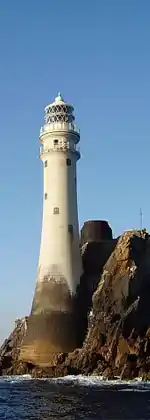.jpg.webp) Blacksod in 2015 | |
| Location | Mullet Peninsula, Blacksod Point, County Mayo, Republic of Ireland |
|---|---|
| Coordinates | 54°05′55″N 10°03′37″W / 54.0985°N 10.0604°W |
| Tower | |
| Constructed | 1864 |
| Construction | granite (tower) |
| Automated | 1999 |
| Height | 12 m (39 ft) |
| Shape | tower rising from a 2-story keeper's house |
| Markings | unpainted (house), white (lantern) |
| Operator | Commissioners of Irish Lights |
| Light | |
| First lit | 1864 |
| Focal height | 13 m (43 ft) |
| Range | 12 nmi (22 km; 14 mi) (white), 9 nmi (17 km; 10 mi) (red) |
| Characteristic | Fl(2) WR 7.5s |
| Ireland no. | CIL-1870 |
Blacksod Lighthouse (Gaelic: Fód Dubh) is a lighthouse at the southern end of the Mullet Peninsula, Erris, County Mayo, at the entrance to Blacksod Bay.[1] It is made of local granite blocks, which are believed to have come from Termon Hill, a nearby isolated outcrop of high quality granite.[2]
The keeper's house is a two-storey square building, which has always been unpainted. It is occupied by a resident lighthouse keeper who is also responsible for Blackrock Lighthouse. Blacksod is of unusual design for a lighthouse, being a square block of a building with only a small conical lantern section on top of which is painted white.
History
The need for a lighthouse at the southern extremity of the Mullet peninsula was first mentioned in 1841 in a letter from Lieutenant Nugent of the coastguard station at Belmullet.[3] The letter requested that a lighthouse be placed on Blackrock Island, but Inspector George Halpin's report to the Board recommended against a light on Blackrock as a general sea light, and stated that a light on Blacksod Point - the Mullet's southernmost extremity - would be a useful light to guide vessels into Blacksod Bay.[4]
Blacksod Lighthouse was built in 1864 by one of the leading merchants in Belmullet at that time, Bryan Carey.[5][6] The light was first exhibited on 30 June 1866, and showed a fixed light with a red sensor over Ardelly Point.[4] At first, the relief keeper ashore from Blackrock looked after the light, but on 1 November 1933, Edward (Ted) Sweeney was appointed as attendant.[4]
Weather observations in June 1944 by the Blacksod lighthousekeepers caused the Normandy landings to be postponed. While remaining neutral during World War II, Ireland continued to supply weather reports to Britain under an agreement in place since independence.[7] D-Day had been scheduled to commence on 5 June 1944, but a report from Maureen and Ted Sweeney (Blacksod's lighthousekeepers) of approaching bad weather fronts caused Eisenhower to delay the invasion until 6 June 1944, when conditions were more favourable.[8][9][10]
In addition to being attendant lighthouse keepers, the Sweeney family were also local postmasters. During the late 1960s, the old cottage where the post office was located was pulled down and a new bungalow, with post office attached, was planned.[11] While this was being built, between 1969 and 1972, with the permission of both Irish Lights and the Department of Posts and Telegraphs, the Blacksod Post Office was accommodated in one of the rooms under the lighthouse tower, marking the first and only time a post office formed part of a working lighthouse.[11]
Towards the end of 1969, Blacksod became the helicopter base for Eagle Island and Blackrock Island lighthouses.[12] As of 1993, the helipad was in use as the base for the monthly visits of the attendant keepers to the automated lights on the two islands.[11]
The house at Blacksod was badly damaged in 1989 by a rogue wave. It was repaired and used by the Commissioners of Irish Lights and the Irish Coast Guard as a refueling station for helicopters. The lighthouse, which used to be family home, was later opened as a visitor centre and offers some guided tours.[13]
Associated lighthouses
The keeper for Blacksod Lighthouse is also responsible for Blackrock Lighthouse at Blackrock Island. Located 12 miles west of Blacksod Bay, the lighthouse on Blackrock is automated and accessible only by helicopter. On 14 March 2017, four Irish Coast Guard personnel were killed in a crash off Blackrock Lighthouse when it was understood they were seeking to refuel at Blacksod lighthouse.
See also
Notes
- ↑ Rowlett, Russ. "Lighthouses of Western Ireland (Ulster and Connacht)". The Lighthouse Directory. University of North Carolina at Chapel Hill. Retrieved 10 February 2016.
- ↑ "Blacksod Lighthouse". Iol.ie. 18 October 1990. Archived from the original on 8 January 2009. Retrieved 26 June 2010.
- ↑ Taylor 2004, p. 88.
- 1 2 3 Taylor 2004, p. 89.
- ↑ "Blacksod". Commissioners of Irish Lights. 26 April 2010. Retrieved 26 June 2010.
- ↑ "Blacksod Point Light". Lighthousedepot.com. Archived from the original on 14 June 2011. Retrieved 26 June 2010.
- ↑ Walsh, Jane (2 June 2014). "How weather forecast from Mayo lighthouse saved D-Day invasion". Irish Central. Irish Centralm LLC. Retrieved 3 June 2014.
- ↑ "Maureen Flavin Sweeney Dies at 100; Her Weather Report Delayed D-Day". New York Times. Retrieved 6 January 2024.
- ↑ McCarthy, Dan (6 June 2014). "The Irishman who gave the D-Day go-ahead". Irish Examiner. Irish Examiner Ltd. Retrieved 6 June 2014.
- ↑ McCabe, Joe (1 June 2014). "How Blacksod lighthouse changed the course of the Second World War A weather forecast from a station in Co Mayo saved the D-Day invasion from potential disaster". Irish Independent. Irish Independent. Retrieved 6 June 2014.
- 1 2 3 Long 1993, p. 157.
- ↑ Taylor 2004, p. 91.
- ↑ "Visit Blacksod Lighthouse". visitblacksodlighthouse.ie. Retrieved 4 November 2021.
Sources
- Long, Bill (1993). Bright Light, White Water. The Story of Irish Lighthouses and their People. Dublin: New Island Books. ISBN 1-874597-40-5.
- Taylor, Richard M. (2004). The Lighthouses of Ireland. A Personal History. Wilton, Cork: The Collins Press. ISBN 1-903464-59-5.
